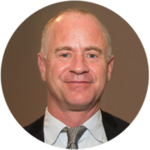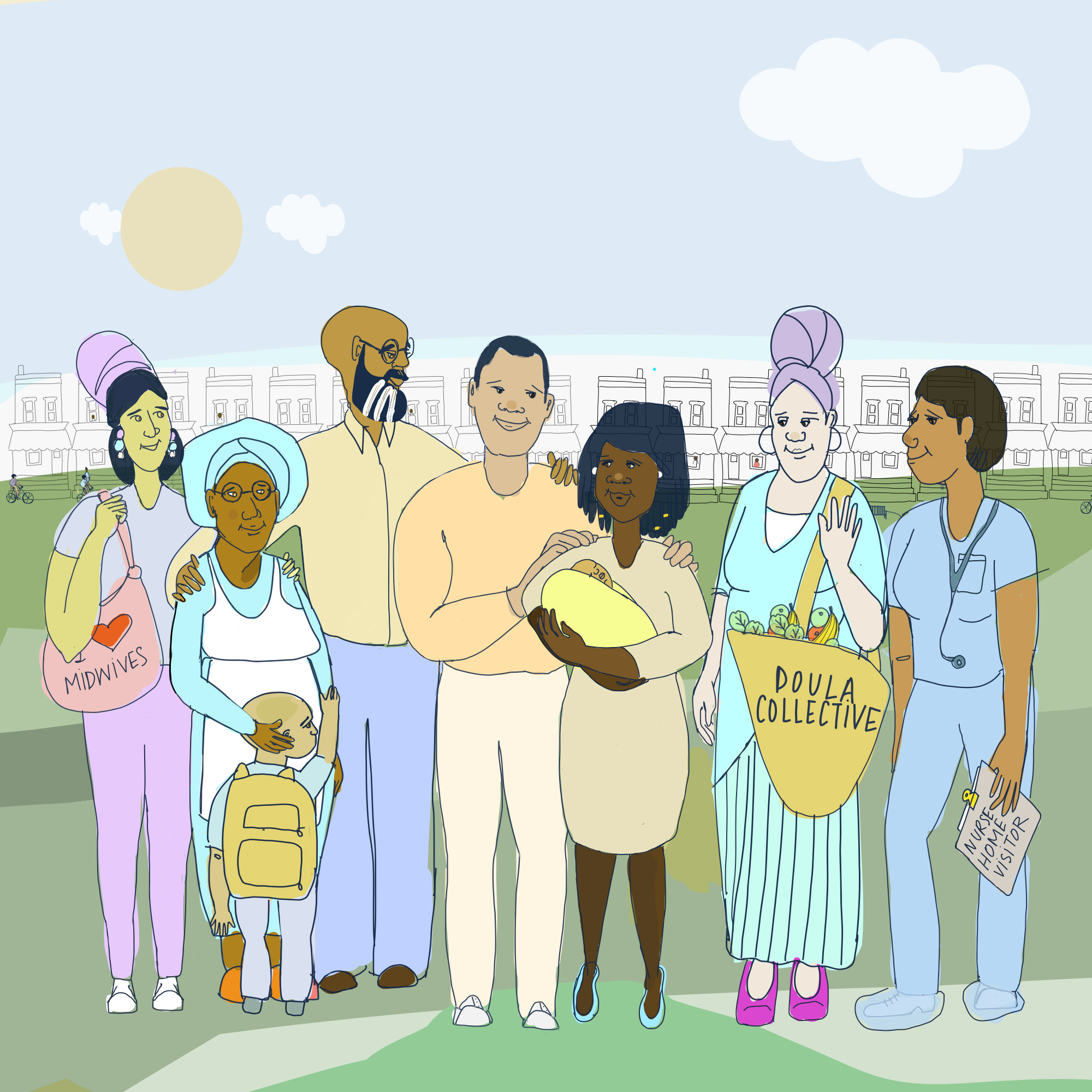Illustration by Ashanti Gardner
We are delighted to share a new strategy to further our commitment to a two-generation approach that deepens the Burke Foundation’s support for initiatives focused on the First 1,000 Days — the time between pregnancy through a child’s second birthday. In approving this approach, our Board of Trustees recognized that this is the most determinative time for a child’s cognitive, socio-emotional, and physical health development and a critical window to reach families with care and supports.
Our emphasis on the earliest years of life began five years ago, in line with scientific evidence of the profound impact those years have on children’s future health and well-being. That commitment led us to a place-based, community-centered approach in Trenton, Camden, and Newark. We made the strategic decision to target our support to families of color, the population with the greatest unmet needs. New Jersey’s alarming rates of maternal and infant mortality — much worse for people of color, with Black women seven times more likely than white women to die from pregnancy-related complications — demanded action. The enormity of the COVID-19 pandemic further exposed and worsened some of society’s greatest inequities, underscoring the urgency of this focus.
Moreover, the First 1,000 Days offers a timely window of opportunity to address the social determinants of health: non-medical factors, such as access to nutritious food, a safe home environment, and adequate financial resources, that can drive as much as 80% of health outcomes. Economic and social stressors that ricochet through households that struggle to make ends meet can undermine the short-and long-term well-being of entire families.
One promising approach to mitigating such situations involves pairing primary prevention in the earliest years with wraparound services for caregivers with young children — delivered by a community-based workforce — to support healthier families, homes, and neighborhoods.
Burke’s approach to grantmaking gives us a unique role as a value-added partner, connector, convener, and problem solver to help build the power and resilience of families and communities. We deploy a range of resources to complement grant funding, including deep community engagement and partnership, technical assistance, support for evaluation and sustainability, and a rich network of connections. This enables us to work with our partners — funders, state government agency leaders, policymakers — to unlock resources and promote policy changes that support scaling promising initiatives, with the aim of sustained financing to ensure long-term impact.
Ultimately, our vision is to create intergenerational impact in economic mobility, health, and well-being by transforming health systems to deliver better care, prevention, and community connections during that First 1,000 Days for babies, mothers, fathers, and families.
Investment Results
As we reflect on the past five years, we are humbled and honored to have supported passionate, dedicated people in New Jersey whose work inspires us every day. The doula who holds an expectant mother’s hand in her twentieth hour of labor and serves as her guide when navigating a complex medical care system to have a healthier birth. The nurse home visitor who helps identify a postpartum infection and facilitates timely health care intervention to avoid a more serious condition and potentially save the mother’s life. The pediatric resident who praises the dad who smiles and snuggles with his newborn son during his first well-child visit, reinforcing the importance of building bonds as early as possible and modeling strengths-based language for the dad to use with his child. The child development specialist who helps a struggling family find transportation to attend their doctor’s visits and makes sure they have healthy food. These, and so many more, are our heroes.
Over these five years, we have invested in best-in-class initiatives that bridge family, community, and clinical care settings. As a place-based funder, we have moved beyond pure grantmaking to build and engage in partnerships and coalitions to pursue sustained systems change. Some illustrative milestones achieved with our partners from the public and private sectors include:
- AMAR Community Doulas is one of the first doula pilots in New Jersey to focus on Spanish-speaking clients. AMAR has served nearly 100 families, trained 23 new doulas, and generated such encouraging results as 71% fewer preterm births and 63% fewer low-risk C-sections. During the pandemic, AMAR doulas were a lifeline for families, providing online breastfeeding support and “porch drops” of critical resources for families such as diapers, baby gear, and groceries.
- Centering, a relationship-based group healthcare model, served 153 families during a one-year implementation phase that yielded 30.3% fewer preterm births, 26.2% fewer low-birthweight babies, and 40% more children who were up to date on immunizations. We also awarded grants to nine new Centering sites as part of our multi-year expansion.
- New Jersey’s inaugural pilot of HealthySteps, an evidence-based, strength-based model integrating a child development expert into the pediatric primary care team, helped almost 2,700 families and made over 1,100 referrals to community resources. Ever watchful for developmental delays, HealthySteps specialists can help children get early intervention services that reduce the need for more costly therapies later on.
- The first pilot in New Jersey of Family Connects, a voluntary, evidence-based model providing a home visit from a registered nurse to all families who deliver at Capital Health Hospital, began serving families in December 2021. Since then, nurses have completed 50 virtual home visits and made 86 referrals to community resources. In one case, a nurse helped a mother and baby find emergency housing when their living situation changed drastically between hospital delivery and the home visit three weeks later.
- Developed by the Mount Sinai Parenting Center, Keystones of Development was introduced to all nine pediatric residency programs in New Jersey to deepen residents’ knowledge of early childhood topics so they can engage caregivers about healthy brain development and nurturing parent-child relationships. So far, 190 pediatric residents have completed the curriculum, now being piloted in family medicine residency programs and within practices with experienced pediatricians.
- A groundbreaking partnership with the New Jersey Department of Children and Families, The Nicholson Foundation, and the Turrell Fund to address the impact of adverse childhood experiences (ACEs), a root cause of lifelong poor health and well-being. One of the NJ ACEs Collaborative’s initial successes was building the first Office of Resilience in the country, under the leadership of national ACEs leader Dave Ellis. This unique public-private partnership helped produce the NJ Statewide ACEs Action Plan, informed by hundreds of stakeholders, including families, community leaders, policymakers, health and education professionals, and judicial leaders across the state. The Collaborative initiated programming in partnership with schools, law enforcement, and communities, including the state’s first-of-its-kind $3 million community program to address ACEs and promote child development.
We see significant successes in these efforts. Some of our piloted programs now have financial support from state government and other philanthropic funders that have followed our lead. As investing in this approach increases, momentum grows — in New Jersey and across the country. These concrete results give us confidence in our approach to amplifying strategies that bridge family, community, and clinical care settings, but there is much more to do.
The Next Five Years: Deepening Our Commitments and Advancing Health Equity
As we look forward to the third annual Black Maternal Health Week starting April 11, we are concerned about the alarming pregnancy, birth, and infant health disparities that persist in a US healthcare system plagued by systemic racism. New Jersey’s rate of more than 46 deaths per 100,000 live births is the fourth worst in the country and nearly 50% above the national average. For women and babies of color, the situation is even more dire: Black babies are nearly four times more likely that white babies to die before their first birthday. And Black mothers have higher rates of preterm births, low birthweights, and low-risk C-sections than their white counterparts.
But we are encouraged by New Jersey’s emergence as a leader in recent years, embracing and amplifying innovative and proven strategies to advance equitable perinatal health care and wellness. First Lady Tammy Murphy galvanized multi-sector stakeholders and resources culminating in the Nurture NJ strategic plan, a roadmap for making the state the safest and most equitable place in the US to have and raise a baby. Additionally, Governor Murphy signed legislation establishing a statewide universal newborn home visiting program in 2021, making New Jersey only the second state to provide this critical postpartum resource. This is a game-changing opportunity to reach all families with the continuum of care in the First 1,000 Days that contributes to positive outcomes and avoids costly interventions.
With landmark developments around maternal child health and early childhood underway in New Jersey, along with promising initial results from our partnerships, we are deepening our investment in areas where we see the largest opportunities for impact at scale to improve the health and well-being of underserved children in our state:
- Transforming and enhancing healthcare delivery and improving outcomes for all families, beginning with pregnancy and into early childhood, by expanding the Centering group healthcare and HealthySteps pediatric team models to promote relationship-based care, primary prevention, and community connections. We will also continue supporting direct-service initiatives in the community and complement primary care — including our community-based doula programs in Trenton and Paterson and our Family Connects pilot in Mercer County — in partnership with the New Jersey Department of Children and Families.
- Growing, diversifying, and sustaining the state’s maternity workforce to deliver enhanced, strengths-based, patient-centered care to women and families by increasing the number of community doulas, public health nurses, and midwives in the state. By investing in the development of a workforce that reflects the community it serves and creating greater economic opportunities, we can increase culturally-congruent care, shown to be effective in reducing maternal and infant mortality.
Over the next five years, we will:
- Expand the transformative CenteringPregnancy and CenteringParenting group healthcare models to 50 sites across New Jersey, serving an estimated 7,350 pregnant individuals and 5,145 babies in locations of highest need from 2020 through 2026. Along with direct expansion, we will invest in an evaluation to strengthen the research base and establish a state-based Centering backbone hub to further scale and advance long-term sustainability.
- Support pilot implementation of the HealthySteps pediatric team model to serve about 2,000 families annually over three years to make the case for scale. The program helps achieve a diverse set of outcomes, including increased childhood immunization and developmental screening rates; well-child visit compliance up to child-age 30 months; longer breastfeeding duration; improved identification and early intervention with maternal mental health and substance-use disorders; and fewer emergency room visits.
- Grow the community doula workforce by training 1,000 additional doulas over 5 years, to serve 50% of Medicaid births in New Jersey. We will approach this effort in partnership with community doulas to design workforce expansion plans centered on their needs, lived experiences, and preferences. To ground our work, we will first engage doulas in order to examine what is needed to link training graduates to viable employment opportunities with living wages and then pilot sustainable career pathways in various employment settings.
- Support recruitment and training of 175 Family Connect community nurses to support successful implementation of the new statewide universal newborn home visiting program, expanding its reach to 94,000 families. Partnering with the state and other philanthropies, we will convene nursing schools across New Jersey to cultivate a pipeline of nurses that can reach all births in the state.
- Invest in strengthening the midwifery profession and support education and training opportunities to create a more racially and culturally diverse workforce. Unlike doulas, midwives are clinicians that provide reproductive healthcare and deliver babies in various settings, including at home, in a birth center, or in a hospital. Midwife-led maternity care has better maternal and infant health outcomes compared to other maternity models.
To complement these strategies and build on our learnings from working to address ACEs and trauma, we believe in the power of safe, stable and nurturing relationships as the foundation of every child’s healthy development. Pediatrician Dr. T. Berry Brazelton (1918-2018), whose wisdom guides the Burke Foundation, reflected:
“When we strengthen families, we ultimately strengthen the community. Our goal is that parents everywhere work with supportive providers, feel confident in their parenting role, and form strong, resilient attachments with their children. To help achieve this, providers must be responsive to parents, knowledgeable about child development, and eager to see every parent succeed.”
We are excited to grow the field of early relational health, an antidote to the damaging effects of trauma and a critical driver of lifelong health and well-being.
We will continue to identify further opportunities to advance early relational health and health equity in the First 1,000 Days, including:
- Championing nurturing caregiver-child relationships and early relational health through specific interventions, policies, and practices
- Supporting the impressive, results-oriented work of our partner, the Mount Sinai Parenting Center, to transform the way pediatric healthcare is delivered by promoting strong caregiver-child relationships and early child development during everyday healthcare interactions
- Identifying promising, culturally-congruent investments to support breastfeeding in Black communities
- Strengthening home-based childcare to help small businesses dedicated to offering flexible and quality neighborhood care grow and flourish
Keeping in mind the adage, “Nothing about us, without us, is for us,” we continue to evolve and explore new ways to work directly with communities. Much more intentionally, we are engaging parents and community leaders in Burke’s initiatives to better understand their needs and the barriers they face and co-design solutions. We regularly host community advisory boards, engage parents as advisors, and interview community members as part of our research and decision-making processes. And we constantly ask who is missing from our tables and make sure to connect with the lived experience of those closest to the work. This is highlighted by our intentional approach in centering community doulas in the effort to build a more equitable and thriving perinatal workforce that will, in turn, help build a more equitable system of care for pregnant women, babies, and families.
We embrace data-driven decision-making and will continue to thoughtfully research and explore promising initiatives to understand what works, for whom, and when. We are eager to consider factors beyond clinical outcomes by also looking at quality of care, trust, and communication between patients and providers. Our deep research process and careful focus on measurement guide our future investments, and we look forward to sharing our learnings with our coalition of partners.
The strategy guiding our next chapter reflects what we have learned about the science of early childhood development, what we hear from our partners and families in the community about critical service gaps, where we see momentum in the field, and our own lessons learned over the past five years. We are excited about the path ahead, and are ready to rebuild systems of care in ways that are more inclusive, responsive, and patient-centered to foster cycles of opportunity across generations for families in New Jersey.
As we make the important changes described above, the Burke Foundation will continue to grow and learn. Thank you for being part of our journey to become a stronger and more effective philanthropic organization. We are energized to dive into what comes next — and seize opportunities for deeper impact — knowing that we do so together in community with you.



